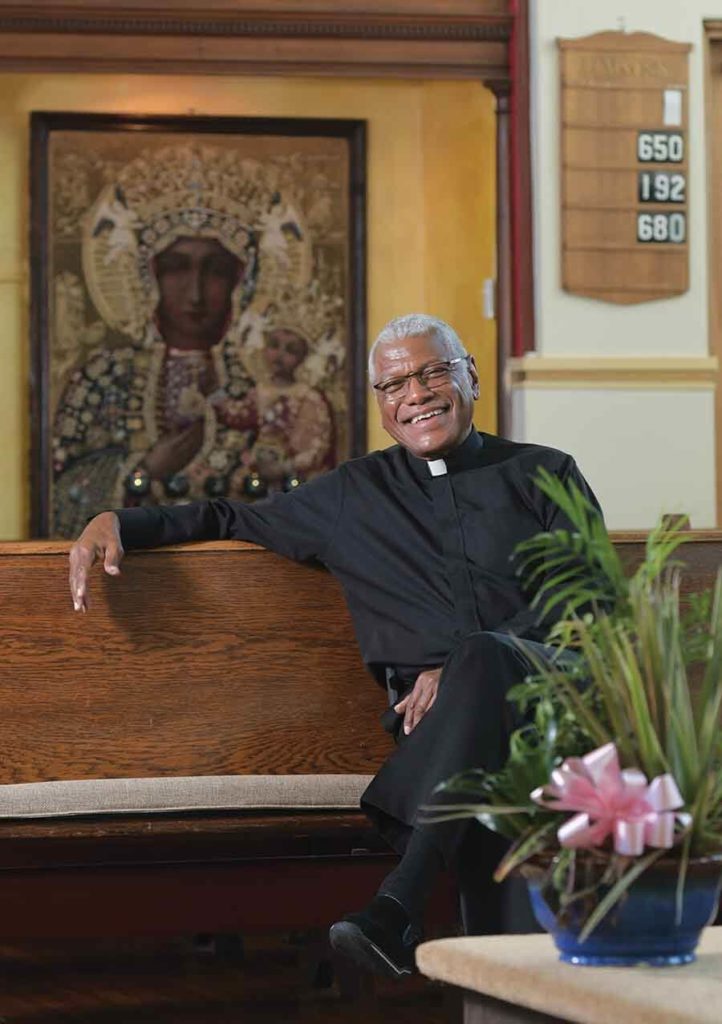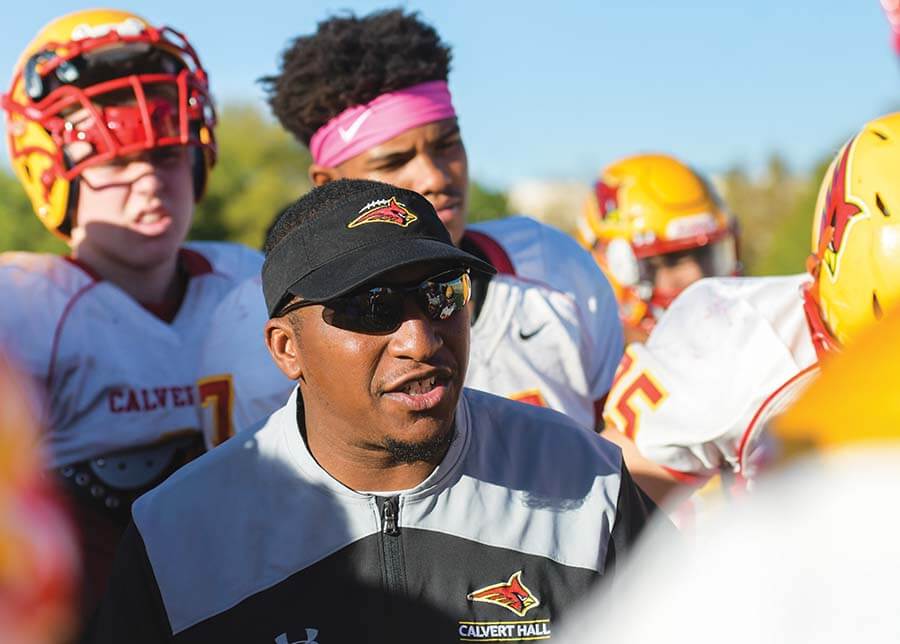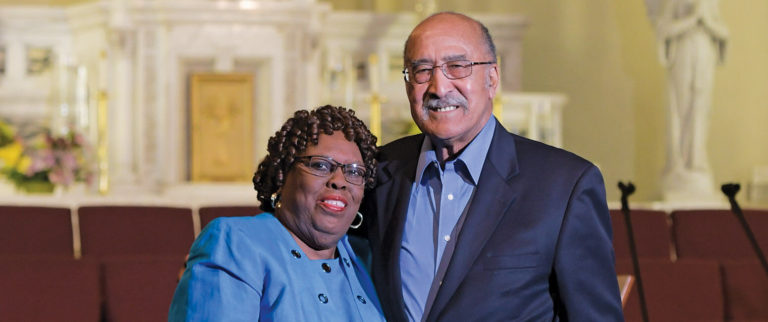Eleventh in a Series
Editor’s Note: Inspired by Matthew 25:40-45, which concludes “ … What you did not do for one of these least ones, you did not do for me,” each month in 2017 the Review will provide an in-depth look at the Catholic Church’s response to those in dire need.
“By the very terms of Christian teaching, we believe that all men are God’s special creatures, made to His image and likeness. … We have an essential duty in justice to recognize and to respect equally the rights of all men.”
– Cardinal Lawrence Shehan, March 1963
Fifty-four years after the 12th archbishop of Baltimore issued a pastoral letter titled “Racial Justice,” the 16th announced the creation of a Statewide Task Force on Racism.
Then-Archbishop Shehan wrote five months before he marched on Washington, D.C., with the Rev. Dr. Martin Luther King Jr., and two years before passage of the Voting Rights Act of 1965.
Archbishop William E. Lori cited the violence in Baltimore City that followed the April 2015 death of Freddie Gray from injuries sustained in police custody and a deadly riot in mid-August incited by a white supremacist rally in Charlottesville, Va.
Archbishop Lori, the son of a Navy veteran who helped fight fascism in the Pacific theater during World War II, wrote that Charlottesville “is a shocking reminder of how much still needs to be done to eradicate the sin of racism in our country, our state, and our local communities.”
He leads an Archdiocese of Baltimore that is a nexus in the discussion, as local history includes:
- Chief Justice Roger B. Taney, a native of Calvert County and a Catholic, writing the Dred Scott decision in 1857 that said that slaves could not become U.S. citizens.
- In 1838, Jesuits selling 272 of their slaves in order to keep Georgetown University open.
- And in 1814, Francis Scott Key, observing the British bombardment of Fort McHenry, including lines in “The Star-Spangled Banner” that are objectionable to African-Americans.
Two centuries later, the nation is again divided.
One side includes those protesting police brutality. The other includes those defending Confederate monuments. Icons brandished include the American flag and the cross, both ones showing Christ crucified and others in flames, symbolizing the Ku Klux Klan, which historically has been anti-black, anti-Semitic – and anti-Catholic.
The Task Force on Racism includes members of the Hispanic community, as well as Valerie Twanmoh, director of the Esperanza Center, a signature program of Catholic Charities of Baltimore. She notes that newcomers face bias not only because of the color of their skin, but their language.
The Least of These series explored the church’s outreach to the immigrant in July. With November being Black Catholic History Month, this installment focuses on the experiences of African-Americans.
Matter of principle
According to Thomas W. Spalding’s history of the archdiocese, leadership ordered the integration of Catholic schools and hospitals in 1962.
That was four years after Mary and Rocky Byrd married and converted to Catholicism for the liturgy and the schools, despite resistance from the pastor of St. Bernardine in West Baltimore.
“Not In My Neighborhood: How Bigotry Shaped a Great American City,” Antero Pietila’s 2010 book on Baltimore’s racial history, wrote that Monsignor Louis Vaeth, who died in 1969, “fought from the pulpit to keep blacks out of Edmondson Village.”
Other priests, however, made them feel welcome.
“I believe in working for my church,” said Mary Byrd, the first black adult to prepare the St. Bernardine altar for Mass. “He (the pastor) didn’t want to mix, but Father (Paul) Witthauer told me about the Cooks (George and Marie). If not for them, I probably would have left St. Bernardine.
“She introduced me to the group, 10 to 15 women, who were not happy to see me, but Mrs. Cook and I got along. She was always talking about her son, the priest.”
That would be Monsignor Paul Cook, now a retired priest of the archdiocese.
In 1964, Mr. Byrd became one of the first two black ushers at St. Bernardine, where his family had been steered to the back of the church.
“Me being headstrong, I put my wife and kids toward the front,” Mr. Byrd said. “We were not invited to the ushers’ activities, until Monsignor (James) Cronin told the ushers, ‘If they can’t be a part of it, it cannot be held at the church.’ I don’t eat oysters, but I wanted access to the oyster roast.
“It was a matter of principle.”
Mr. Byrd became a eucharistic minister; Mrs. Byrd the Maryland State Regent for the Catholic Daughters of the Americas. An accountant, she worked for parish schools that educated their children, Lendora and Raymond, who went on to the Institute of Notre Dame and Cardinal Gibbons.
Of Monsignor Cronin, Mrs. Byrd said, “We loved him and he loved us back. He tried to get blacks and whites together; we’d go to each other’s homes. That still didn’t stop them (whites) from moving out.”
Of Monsignor Ed Miller, also deceased, who shared hate mail he received after the parish added a Gospel choir to 11:30 a.m. Sunday Mass, she said, “Excluding my husband, he was my best friend. … He was my gift from God.”
Conversion

The archbishop’s task force includes Father Donald Sterling, pastor of New All Saints Parish in Liberty Heights. What are his hopes for the group?
“That we won’t repeat the same things we’ve done,” Father Sterling said, “but make a true commitment, to bring about constructive change predicated on the principles of Jesus Christ and really face the hard questions.”
He was a minority student at both St. Ann’s parish school and Archbishop Curley High School in northeast Baltimore, but it wasn’t until he was a second-year seminarian at Resurrection College in Kitchener, Ontario, that he felt wounded because of his race.
“Dr. King’s assassination (in April 1968) was a wake-up call,” Father Sterling said. “We were huddled around the TV, trying to see what was going on in the United States. One of my good friends and classmates looked at me and said, ‘Donald, I’m glad they killed that troublemaker.’
“I looked at him and said, ‘You didn’t say that to me.’ It spoke volumes. … He cannot see that I am the same as Dr. King. That’s related to this issue of race relations; people might deal with an individual, but they can’t deal beyond.”
That exchange led Father Sterling to request a transfer to St. Mary’s Seminary in Baltimore, one which was approved by Cardinal Shehan. Ordained in 1974, he became pastor of St. Cecilia three years later. He has been at New All Saints since 1992.
He asks for more interaction between urban and suburban parishes, and for more Catholic schools in the city.
In early July, he was a featured speaker at the 12th National Black Catholic Congress in Orlando, his subject being racism, how “people of color were systematically put into as chattel, to enrich people, (including) the Founding Fathers.”
“We can’t start without acknowledging the past,” Father Sterling said. “We’ve got to go through a metanoia, a change of heart. It’s been woven into people’s consciousness, that this (racism) is alright, rather than us being responsive to each other as true brothers and sisters in Christ.”
He cites Scripture.
“God’s law is what?” Father Sterling asked rhetorically. “Everybody is equal, and we are to love one another as he loves us. That’s a major change for a lot of people, I know, but that’s where we’ve got to be.
“If we do that, we’re not dealing with political fall-out, we’re dealing with it in the context of bringing people to a real conversion.”
Coach them up

When Donald Davis entered Calvert Hall College High School as a freshman in 1992, he said, “I very much felt like a minority, because I never had a white teammate in the Northwood Rams (football) organization.”
When he returned to his alma mater to coach varsity football and teach an assortment of subjects that include African-American Literature, it was with a degree in sociology from The Johns Hopkins University and intimate knowledge of what minorities call “driving while black.”
“As a young adult, I got rid of an Acura Legend because it got me pulled over too many times,” Davis said. “I was starting a family. I didn’t want that.”
Mindful that young minds are more malleable, Davis tells his players, “We live in a diverse world, and you play on a diverse team.”
“We’ve got 108 ZIP codes here,” Davis said of Calvert Hall. “We have guys who are black, guys who are white, guys who are multi-racial. Some kids catch two city busses to get here; others drive a Mercedes Benz. We’ve got guys who have lost a parent.
“To have a locker room with all of that, it gives every one of those kids a different understanding and appreciation for that which is unlike them. Because you’ve experienced so many people different from you, you don’t then see just the differences.”
His players interact about everything from their favorite video game to the imbroglio over the national anthem in the NFL.
“I want them to have an open mind, and see everything,” Davis said. “If you only see one side, can you see everything? It’s the educational process, explore how and why the world and people work. Don’t get so caught up in which side of the fence you want to land on.”
In the classroom or calling plays in the Turkey Bowl against Loyola Blakefield Thanksgiving Day, Davis is aware that he serves as a role model, not just for black teens, but their teammates and classmates.
“I’m in a position to tear down stereotypes,” Davis said. “I believe that.”
Also see:
The Least of These: Pro-life activism goes beyond sidewalk’s end
The Least of These: Welcoming the stranger
The Least of These: Helping victims of modern slavery become survivors
The Least of These: Stella Maris volunteers bring companionship, Communion to the dying
The Least of These: Care for prisoners doesn’t stop after release
Fugett’s remarkable path includes being prep pioneer


